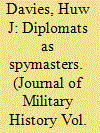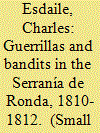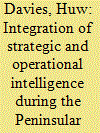| Srl | Item |
| 1 |
ID:
116768


|
|
|
|
|
| Publication |
2012.
|
| Summary/Abstract |
During the Peninsular War, General Lord Wellington orchestrated and utilised one of the most sophisticated intelligence collection apparatuses of the nineteenth century. Not only was the intelligence collected by his own personnel made available to him, but so too was that collected by a group of civilian agents recruited and controlled by the British diplomats in Portugal and Spain, Charles Stuart and Henry Wellesley. This article analyses the organisation and evolution of these intelligence networks during the critical years of the Peninsular War. It then explains the impact of this intelligence on Wellington's military planning, specifically focusing on the opening campaigns of 1812. It then locates the historical importance of the intelligence networks developed in the Iberian Peninsula, by comparing them with later examples during the Crimean War (1853-56), and preceding the outbreak of the First World War (1914-18)
|
|
|
|
|
|
|
|
|
|
|
|
|
|
|
|
| 2 |
ID:
133515


|
|
|
|
|
| Publication |
2014.
|
| Summary/Abstract |
The Spanish Guerrilla (1808-1812) which has given its name to ideologically motivated insurgencies is usually portrayed as a patriotic uprising against the French occupation forces of Napoleon. It was that, in part, but also many other things besides. This case study illustrates its overlap and convergence with banditry but also with social unrest turned into uprisings directed by poor Spaniards against their creditors, as in the storming of Ronda by insurgents in 1810. From the propaganda of the day to the subsequent Spanish patriotic historiography, there has been a tendency to exaggerate the amplitude of events and also the damage that was done to the French forces and the casualty figures inflicted on them.
|
|
|
|
|
|
|
|
|
|
|
|
|
|
|
|
| 3 |
ID:
072668


|
|
|
|
|
| Publication |
2006.
|
| Summary/Abstract |
Wellington is well known for his understanding of the importance of intelligence, but so far history has recorded that he presided over a one-man intelligence department, himself being the only analyst of what proved to be a massive quantity of raw information. New research highlighted in this article reveals that this has been an inaccurate interpretation. The British government also acted to establish a civilian network of correspondents and agents communicating with the British ambassadors to Spain and Portugal. Wellington's main priority was to integrate the 'strategic intelligence' collected by government agents with his own 'operational intelligence'. Instead, analysis was conducted more by Wellington's subordinates in the field, applying their personal localized expertise to the information they received. In this way, an early and primitive form of the staff system later developed by the Prussians was created in the Peninsular War.
|
|
|
|
|
|
|
|
|
|
|
|
|
|
|
|
| 4 |
ID:
100548


|
|
|
| 5 |
ID:
073529


|
|
|
|
|
| Publication |
2006.
|
| Summary/Abstract |
Wellington's use of intelligence developed throughout his military career. Arguably, his experiences in India taught him the importance of intelligence, but it was during the Peninsular War that he honed his analytical techniques. As the war progressed, he developed sophisticated methods for the integration of strategic intelligence - largely gathered by civilian agents - with operational intelligence - collected by military personnel. This allowed him to develop operational conceptualisation, which in turn contributed to the successes he achieved over the French forces in Iberia. However, more than anything, it was his considered use of intelligence, combined with intricate deception operations in the latter stages of the conflict, which deprived the French of reliable intelligence on his own movements, and demonstrated his understanding of the importance of intelligence. This article investigates Wellington's increasing awareness of the importance of intelligence and deception during the Peninsular War.
|
|
|
|
|
|
|
|
|
|
|
|
|
|
|
|